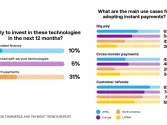Is your company prepared for digital disruption?
Because apparently, a lot aren't.
Today’s disruptive technologies--such as social media, mobile, analytics and cloud computing--are redefining products, services and markets and are fundamentally transforming how businesses are run.
According to a release from KPMG, just as Amazon changed the game in the retail sector and Netflix transformed how we consume videos, companies like AirBnB and Uber are shaking up the hotel and transportation industries.
While many companies are concerned about digital disruption, few are adequately prepared to address it, a recent KPMG global survey found. The survey was conducted with KPMG International member firms’ advisors
worldwide who work closely with end‐user organisations.
Mr Bob Hayward, Managing Director of KPMG’s newly created Asia Pacific Centre of Excellence (CoE) for IT Leaders, said, “The bad news here is that best technology practices are still not widely adopted even after all these years and money spent.
The good news is that there is substantial opportunity for most companies to improve how they manage and use disruptive technologies, and to reap significant business benefit once they do.”
Established in November 2014, this new CoE aims to advance industry leading thinking and insights across the Asia Pacific region, and help companies transform their IT capabilities.
It is helmed by Mr Hayward, an IT industry veteran and serial digital entrepreneur, who recently relocated to Singapore. With the hype and noise associated with disruptive technology, many companies are struggling to balance the innovation it brings with the need to simultaneously drive cost competitiveness and increase value‐add to the business.
“The CoE is here to help, by helping companies separate the signal from the noise, articulate a clear business case for digital transformation, and provide an overall framework to operationalise the digital strategy,” explains Hayward.
Here's more from KPMG:
Knowing where to start is one of the biggest challenges that many organisations face with digital transformation.
Without a strategic plan, it becomes all too be easy for a company to go off in too many directions at once, diluting the investment and stretching already constrained skills.
However, only 36 percent of companies represented in KPMG’s survey have a digital business strategy in place in one or more business units. Only eight percent have a digital business strategy that is enterprise‐wide.
Designing the strategy involves defining what ‘digital disruption’ means to the organisation at all levels, enumerating threats and opportunities and creating a roadmap for meeting implementation challenges.
“Creating the strategy is a great way for CIOs and their internal clients to start working through all the benefits that new technologies could hold for the business,” says Hayward.
When it comes to digital transformation, speed is crucial.
“CIOs need to shift from ‘big bang’ IT projects to the use of agile development processes, which see IT and the business working together on discrete digital initiatives in an incubator or lab‐type environment where ideas can
be quickly developed and tested,” says Hayward.
Indeed, agile development processes are fast gaining traction. Almost half of the companies surveyed use agile development processes on 25 percent or more of their Information Technology (IT) projects.
Responding to digital disruption involves implementing innovative technologies that require new skill sets that are in high demand. A large majority of companies cite a lack of critical skills as their biggest challenge in this area.
“Demand for IT capabilities is high but supply is thin. To compete, organisations need to invest in acquiring new skills and improve the maturity and performance of existing capabilities required for digital transformation,” says Hayward.
“Some of these improvements can come through developing existing IT staff, recruiting internally from other departments and leveraging centres of excellence.
Others will require acquiring external capabilities whether through direct hiring, outsourcing/contractor relationships or strategic acquisitions. Usually, a mix of these options is needed to extract full value from digital transformation efforts.”



















 Advertise
Advertise







